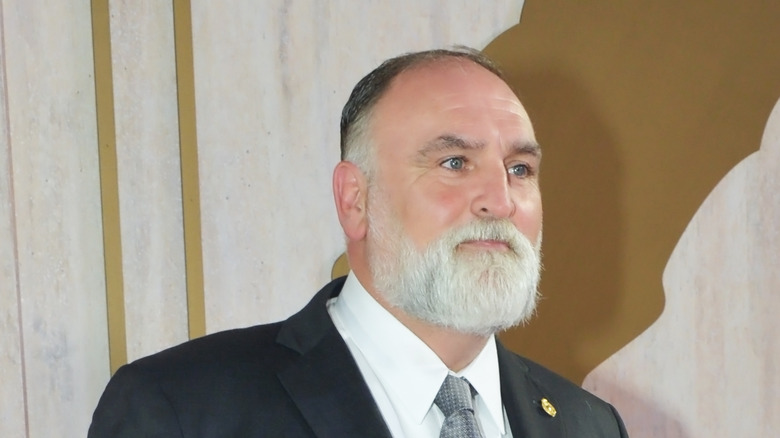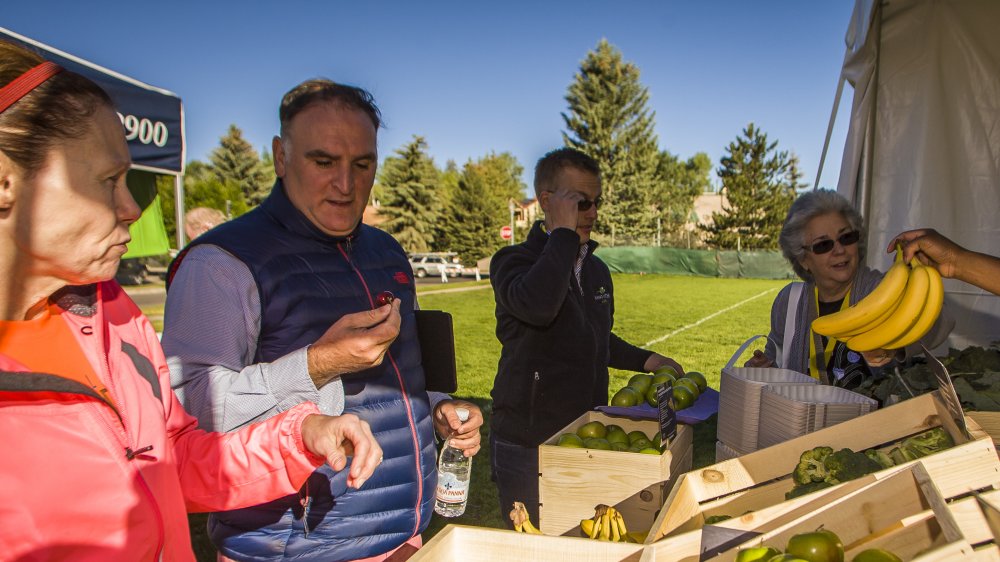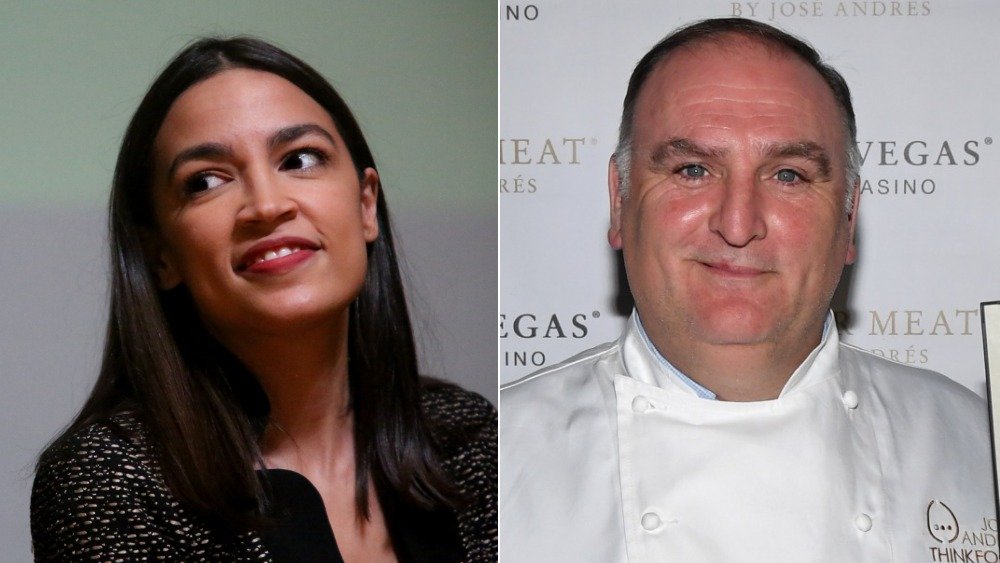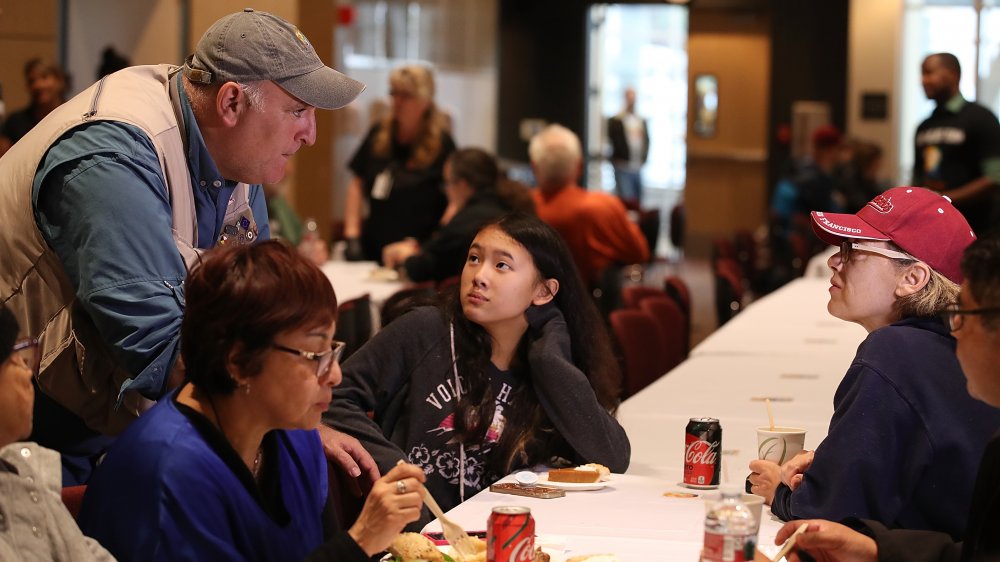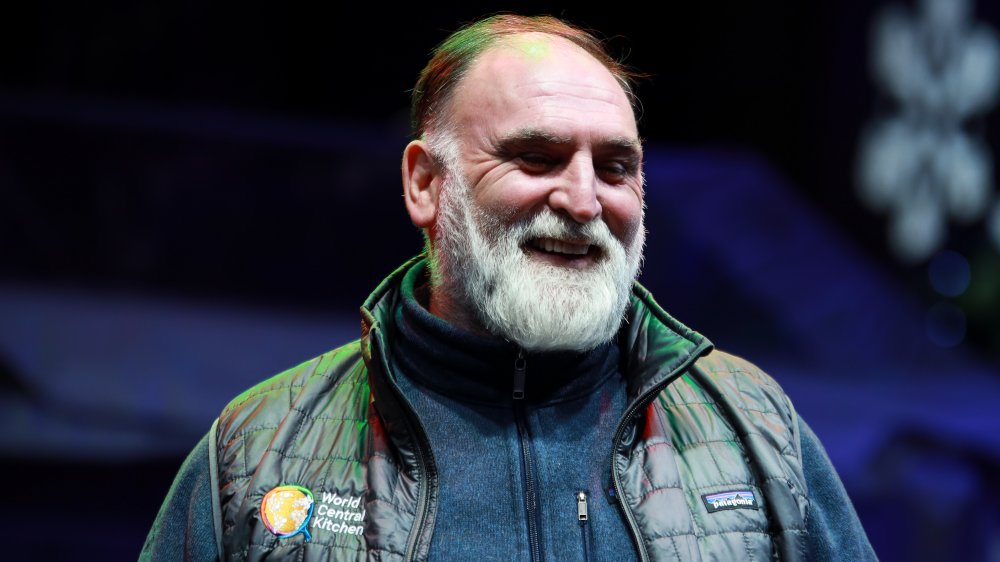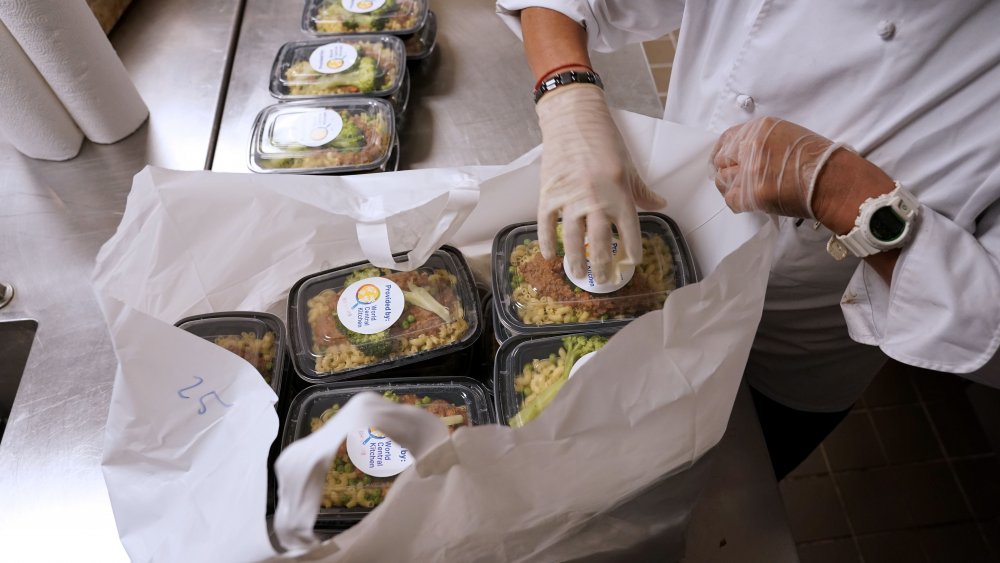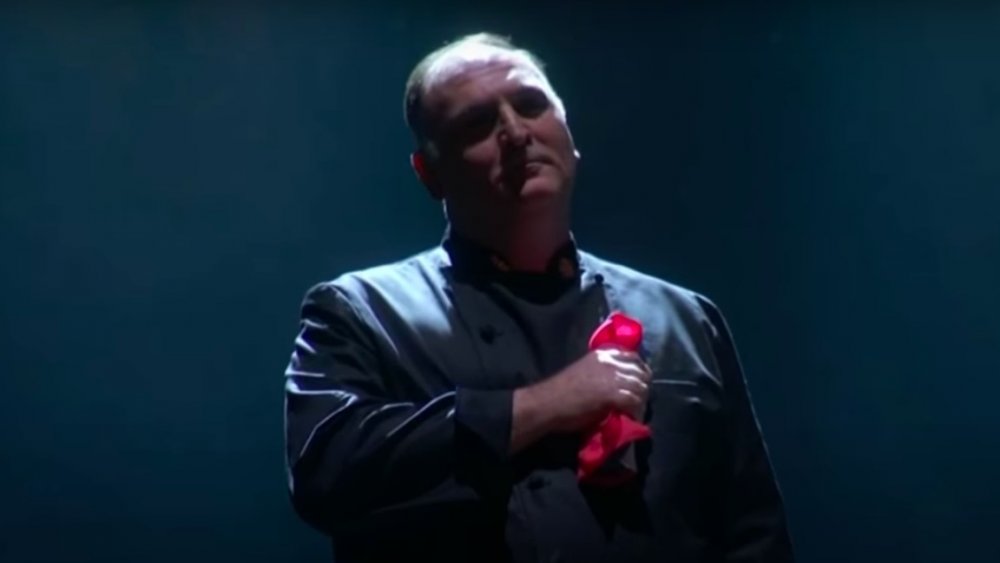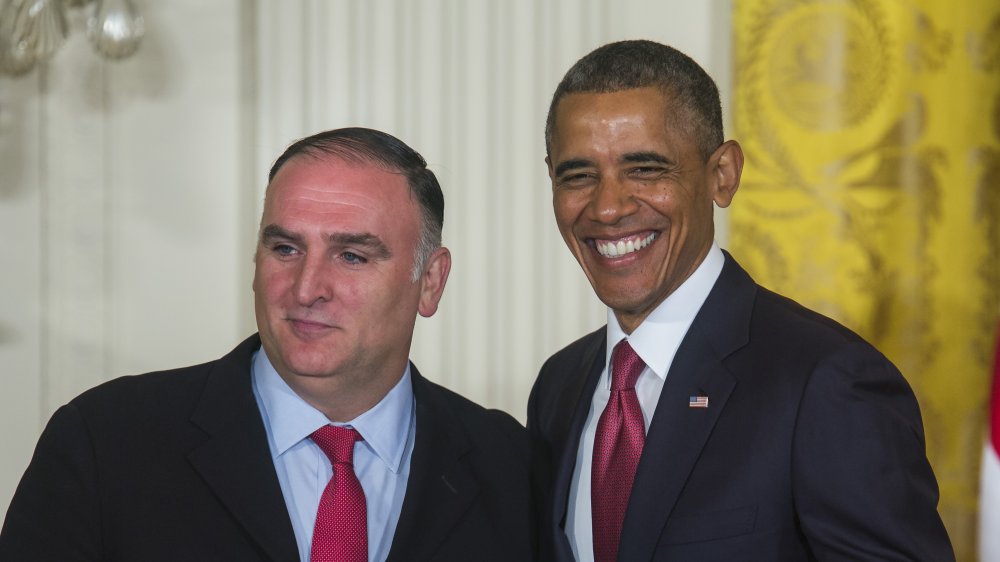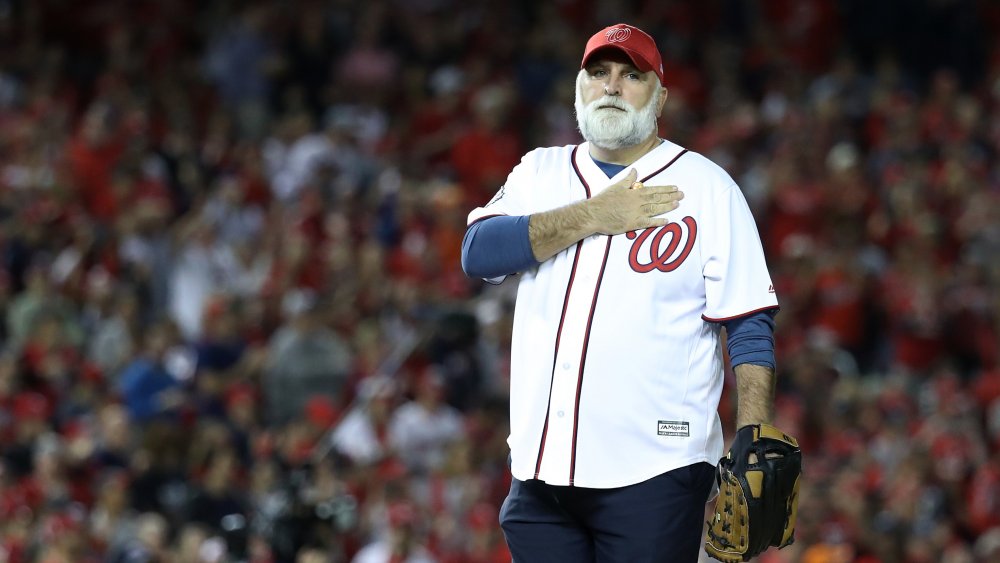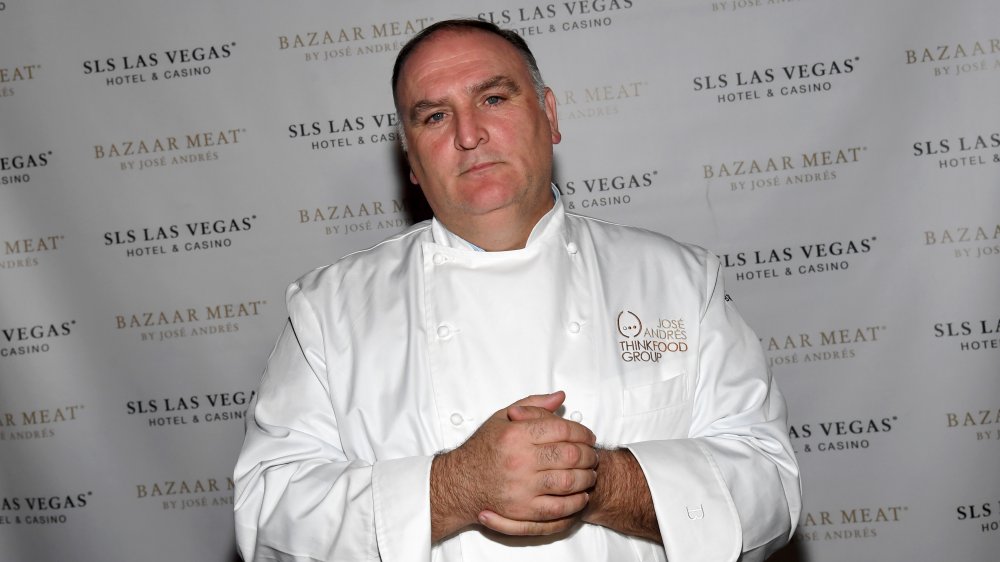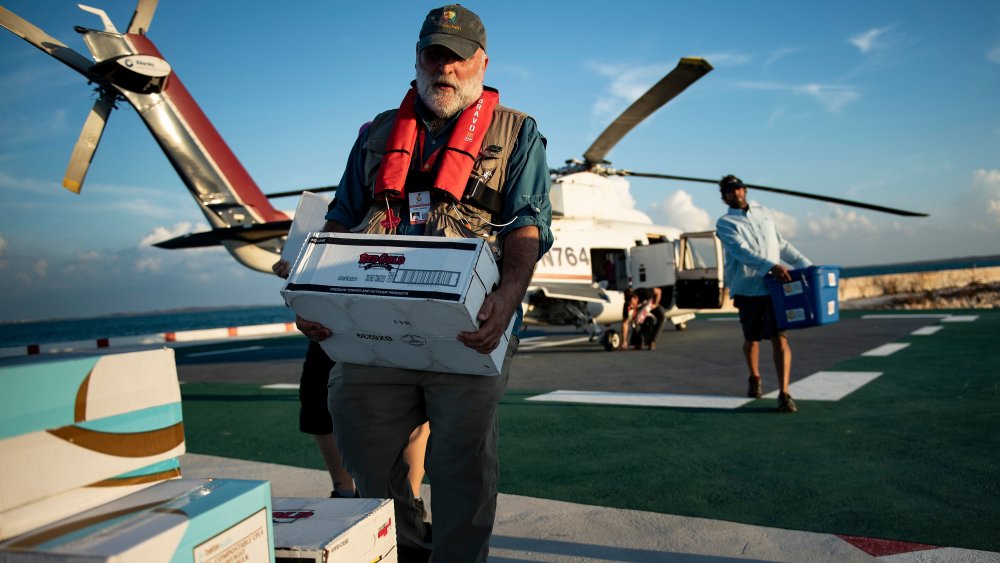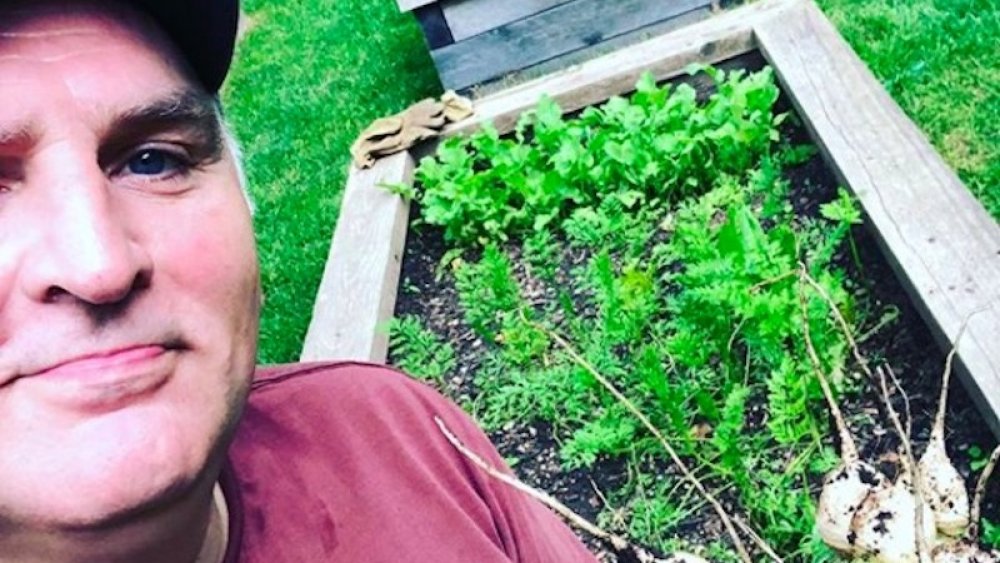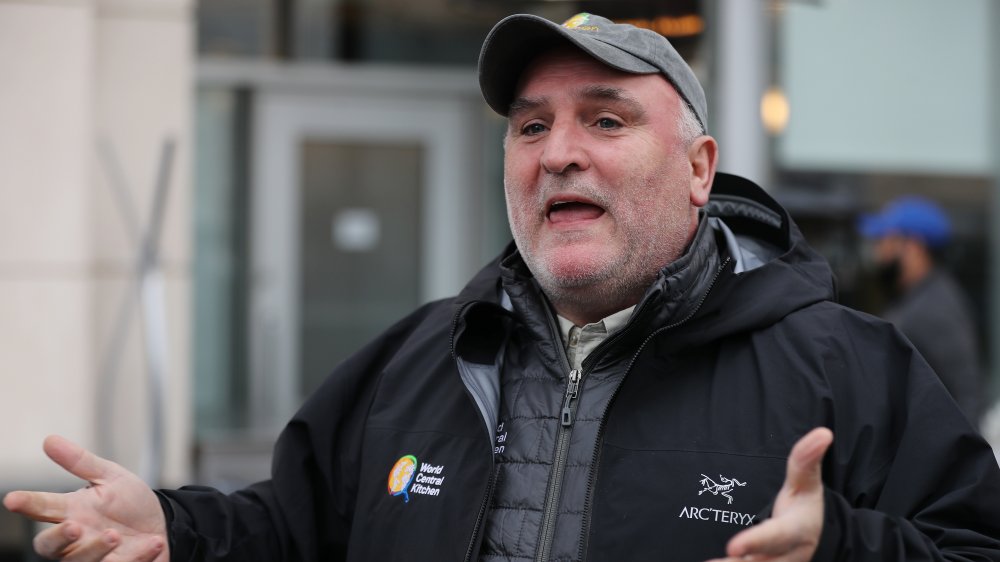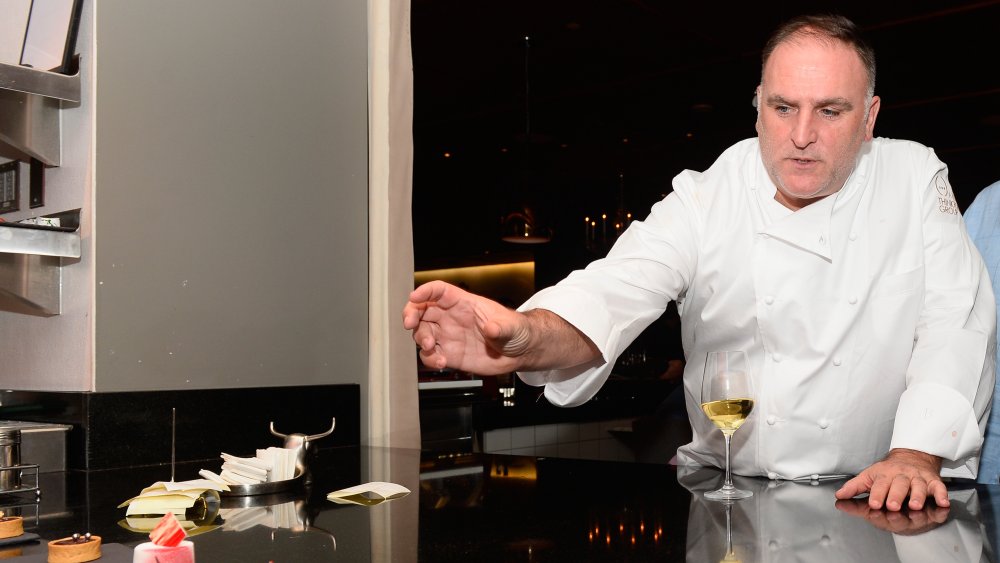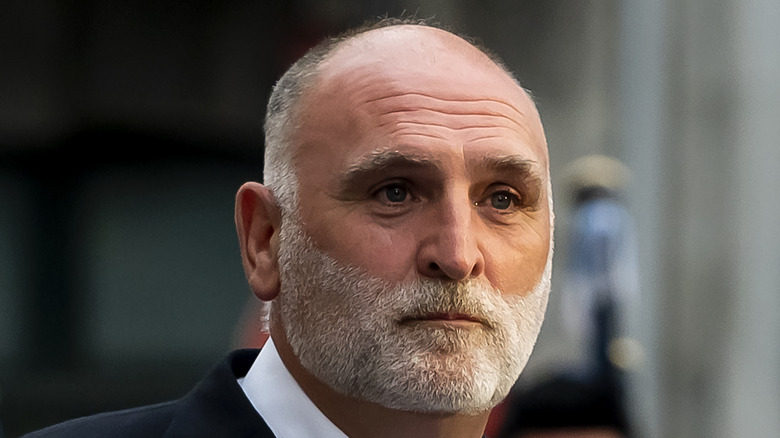The Untold Truth Of José Andrés
Chef José Andrés' culinary career began in his native Spain, where he attended Barcelona's Escola de Restauració i Hostalatge before apprenticing with chef Ferran Adrià at his famed restaurant el Bulli. In 1991, Andrés' pursuit of his dreams took him to New York City, where he soon became a trailblazer in popularizing Spanish-style tapas in North America. Before long he began opening his own restaurants, eventually more than 30, all under the auspices of his ThinkFoodGroup organization, winning acclaim, fame, and numerous awards along the way.
As his star rose, Andrés wasn't content to merely forge new trails in food; he expanded his purview to include social activism. In 2010 he founded World Central Kitchen, a nonprofit devoted to feeding hungry mouths in the wake of natural disasters. Andrés' efforts ranged from providing food to those who lost their homes to California wildfires to serving more than 3.6 million meals in Puerto Rico during the aftermath of Hurricane Maria.
Yet, that was just a warmup for his ambitious plans and herculean efforts during the COVID-19 pandemic, which landed him on the cover of Time magazine. This world-class chef and celebrated humanitarian has accomplished much in a relatively short period of time, yet there's still much to learn about the life of José Andrés.
José Andrés' transformation from chef to activist began with a single phone call
José Andrés' journey toward activism began with a 2010 phone call. As Andrés told Fast Company, Manolo Vílchez, head of a Spain-based solar-powered-stove company, was planning a humanitarian trip to Haiti to distribute solar-powered cooking equipment to citizens in the aftermath of an earthquake, and invited Andrés to join him. Over the years, Andrés had volunteered at soup kitchens in Washington, D.C., even teaching cooking classes in disadvantaged neighborhoods, and he jumped on the opportunity to help people on a larger scale.
He spent two weeks in Haiti, setting up more than a dozen solar-powered cooking setups throughout the island and teaching residents how to use them. When he returned, he met with Robert Egger, head of D.C. Central Kitchen, a charity that began by taking unused food from D.C. restaurants and feeding it to the city's homeless. Andrés proposed setting up an international iteration of the organization.
Andrés' ebullient personality proved invaluable in raising money for this new venture, dubbed World Central Kitchen, handily convincing wealthy donors and large corporations to part with their money for a worthy cause. Egger told Fast Company, that the chef "has a record of pulling stuff out of his a** and making it work."
José Andrés offered Alexandria Oscasio-Cortez a place to stay in D.C.
After being elected to Congress in November of 2018, Alexandria Ocasio-Cortez was preparing to move from her home in Brooklyn to Washington, D.C. The 29-year-old former bartender spoke with the New York Times about her move, framing it in the context of income inequality. As she explained, the transition period was "very unusual because I can't really take a salary," she said, pointing out she'd effectively be without income for three months. "So how do I get an apartment. Those kind of things are very real."
José Andrés' had a solution. When she issued a tweet in reference to the interview, declaring there was "no reason to be ashamed and embarrassed" by not having money, the chef responded to her unique circumstances by extending a characteristically generous offer.
"Dear Congresswoman: you have a room, a shower, and a plate on my family table for as long as you may be in need of one," he wrote to her via Twitter; there were no subsequent reports, however, that she took him up on his invitation.
A top Hollywood director is making a movie about José Andrés
The humanitarian efforts of José Andrés' attracted the attention of a Hollywood heavy-hitter. Ron Howard, director of such movies as The Da Vinci Code and Solo: A Star Wars Story, revealed that he and producer Brian Grazier were making a documentary about the chef for the National Geographic channel.
The documentary, reported The Hollywood Reporter, would focus on Andrés' work with World Central Kitchen. According to Howard, Andrés landed on his radar while he was shooting an earlier documentary, Rebuilding Paradise, about the efforts of the citizens of Paradise, California to rebuild their lives after devastating wildfires swept through the area in late 2017. After watching Andrés in action in Paradise, Howard said he came to realize "that the work he's doing around the world is one of the most critical and oftentimes overlooked necessities in disaster relief."
Serving meals to people who've just survived a fire, flood, hurricane, or other natural disaster, Andrés explained, isn't just about the food itself. "A hot meal is comfort, dignity, hope — a sign that someone cares and that tomorrow will be better," he said.
How José Andrés is trying to stop food waste
Food waste is a huge problem in the hospitality industry. According to statistics from the U.S. Department of Agriculture, 133 billion pounds of available food went uneaten in 2010. It's an issue that José Andrés decided to address head-on. As he explained in an interview with Stop Food Waste Daily, Andrés cited the lessons he learned from D.C. Central Kitchen founder Robert Egger, whose organization was founded by accepting donations of unused food from the city's restaurants and banquets and feeding it to the city's homeless population. Andrés took the concept further by working with farmers who supply restaurants and urged them to donate fruit and vegetables that would be deemed too "imperfect" to serve in a restaurant and would otherwise be thrown away.
According to Andrés, he and his family try to be mindful of food waste by focusing on sustainability at the household level, growing their own vegetables and harvesting honey from backyard beehives. He also offered some advice for those who want to follow in his footsteps, advising to "not throw away any scraps of food on your plates — make them your lunch tomorrow!" In fact, he declared that some of his most enduring recipes originated as "yesterday's meals."
José Andrés has an ambitious plan to keep restaurants open and feed communities in need
When restaurants were forced to shut down during the COVID-19 pandemic, José Andrés saw an opportunity to provide meals to those who desperately needed them while keeping some restaurants open and staff employed. In an interview with The Washington Post, Andrés laid out the ambitious plan he was implementing through World Central Kitchen's newly launched Chefs for America initiative.
According to Andrés, his organization would pay a restaurant between $10 and $20 per meal, allowing the eateries to rehire furloughed staff and cover the cost of the food. "This is only a drop in the water," admitted Andrés, explaining the goal was to roll out the program throughout the country and get restaurants back to work while helping communities in need — a win-win proposition if there ever was one.
As World Chef Kitchen chief executive Nate Mook told the Post, the only way to save restaurants from going under was to get them back in operation, even if it was in such a non-traditional manner. "The staff going back, getting a paycheck," he said. "The restaurants buying from the suppliers that are also impacted by this. You got to get the whole machine going again..."
José Andrés received a standing ovation at the Oscars
José Andrés made a surprise appearance at the 2018 Academy Awards, and wound up being met with a standing ovation. It took place during a musical performance from rapper Common and singer Andra Day, performing their Oscar-nominated song "Stand Up for Something" from the film Marshall.
As the singers appeared on stage, spotlights shone to reveal 10 activists who had been personally invited by Common to join him onstage. Andrés was one of them, due to his tireless relief efforts in Puerto Rico the previous year through his World Central Kitchen charity. At the end of the performance, Andrés memorably unfurled a Puerto Rican flag as the audience rose to its collective feet.
"I thought, 'What if we got people who really do the work?'" Common told Variety of how he came up with the idea of bringing Andrés and the other humanitarians onstage for the performance. "People who are true activists out in the world and on the front line. People whose lives, whether by circumstance, have become prime movers for change."
José Andrés has some tips for the best dining experience in Spain
Although José Andrés is a naturalized American citizen, and has called America home since the early 1990s, his culinary influences still hearken back to his native Spain. In an interview with Bizarre Foods host Andrew Zimmern, Andrés was asked to highlight three "must" dining experiences that visitors to the country should seek out.
"I would tell you that the best places to eat are at the small bars. They are so astonishing," advised Andrés, admitting it would be "impossible" to narrow it down to just three. He did, however, recommend a restaurant called Casa de Balbino in the town of Sanlúcar de Barrameda, "which has the best tortillitas de camarones or baby shrimp fritters."
During his conversation with Zimmern, Andrés declared that childhood trips to Spanish markets, with vendors selling "the most amazing vegetables, beans, cheeses, and eggs," became a defining experience. Visiting those markets, he explained, helped him to "really appreciate the goodness of the earth and what first planted the seed of cooking. As a young boy, I was always amazed by the possibilities of food so these markets were always a big inspiration."
José Andrés will "never say no" to a foray into politics
A longtime resident of Washington, D.C., José Andrés has rarely been shy about expressing his political opinions, especially when they involve his humanitarian efforts. And while he's never publicly expressed any political ambitions, he's admitted that he's also not willing to entirely close the door on a potential future in politics.
"You can never say no," the chef said in an interview with Garden & Gun, revealing that politicians he knew were not thrilled at the prospect of running against the wildly popular celebrity chef in an election. "Some of them have contacted me — 'Are you serious? Are we going to have to compete with you?'" Andrés said.
Although he wasn't interested in politics at that moment, Andrés believes that every American, whether he or she holds elected office or not, should be thinking of what they'd like to achieve if they did have the power to make legislative changes. "We all need to have thoughts about how to make a more perfect Union," Andrés explained. "We should all be contributing in a meaningful way. The world is a much happier place when you contribute."
José Andrés turned a baseball stadium into a community kitchen
Major League Baseball was one of numerous professional sports leagues to suspend its season in the midst of the COVID-19 pandemic. When the stadium used by the Washington Nationals in José Andrés' adopted hometown sat empty, he unveiled an audacious plan. Through his World Central Kitchen, Andrés partnered with the Nationals and its Nationals Philanthropies charity to use the team's stadium, Nationals Park, as a location to cook and distribute thousands of free meals for the city's residents.
As Eater reported, two massive kitchens in the facility had been sitting unused, and were now being utilized for the preparation of hot meals. "We are stewards of this public building — it's not used to play baseball now, so how can we use it in the best way possible?" said Jonathan Stahl, vice president of experience and hospitality for the Nationals.
Teaming up with Andrés' World Central Kitchen, added Stahl, was "a no-brainer," given that Nationals Park offers "very large kitchens and a lot of fire power where we can produce a lot of food quickly and efficiently."
José Andrés believes learning about food is a life-long journey
There are few people on the planet whose knowledge of food can rival that of chef José Andrés, yet he still believes he has much to learn. "I spend my whole life traveling, eating, milking cows, making cheese, fishing, learning every aspect, and I still [know nothing]!" he told GQ in 2016. Despite having amassed all that information, he admitted he believes one is never too knowledgeable — or too old — to stop learning new things. "I'm still in discovery mode," he said. "I consider myself still young — I'm a 47-year-old walking millennial."
As an example of how much can be learned about things people assume they know all about, he cited the versatility of what is arguably the most basic ingredient there is: water. "You can steam it, or you can boil it, or you can freeze it, and you can do different forms of ices, and forms of frozen, and you can make croquettes and you can make puff pastry," he explained. "Water allows us to do anything."
José Andrés served more than 300,000 free meals in the Bahamas
The World Central Kitchen has earned a reputation for being able to mobilize immediately in the event of a natural disaster, which is precisely what happened when Puerto Rico was devastated by Hurricane Maria in 2017. José Andrés and his nonprofit were also on the ground in the Bahamas in 2019 after Hurricane Dorian cut a swath of destruction through the Caribbean. According to American University Radio, World Central Kitchen wound up serving more than 300,000 free meals in the Bahamas.
One key lesson that Andrés has come to learn after responding to multiple disasters over the years is the importance of arriving at the scene early. In fact, as he told NPR, he and his team arrived in the Bahamas before the hurricane had entirely abated, facing heavy rainfall and 80 mph winds. "We are learning that pre-positioning yourself in a hurricane buys you precious time," he said, explaining that arriving two or three days after the event is often too late when people have lost everything and have no food.
However, Andrés was quick to point out that his organization doesn't claim to have developed "any technique that is very difficult or very special. What we have is we have a lot of empathy."
José Andrés thinks vegetables deserve more respect
In 2019, chef José Andrés released a cookbook titled Vegetables Unleashed, part of his mission to elevate vegetables from a side dish to a meal's main attraction. "Vegetables and fruits are much more interesting than a piece of meat," Andrés insisted in an interview with WBUR radio. Creating the cookbook, he explained, was his way of saying, "Hey, vegetables are here. We need to take them seriously. But don't be afraid of them. Vegetables are fun, they are mayhem. They like to misbehave."
The cookbook includes one dish that Andrés admitted is "the most insane recipe" he's ever developed: compost potatoes. As he explained in an excerpt from Vegetables Unleashed shared by WBUR, the recipe was "conceived in a fit of passion" when Andrés impulsively dumped some coffee grounds into a roasting pan, added some Peruvian blue potatoes grown from his garden and then dumped the contents of his compost bin on top of the concoction.
"It sounds crazy, but it makes sense," Andrés wrote, noting that by using the same compost he placed into the soil in which the potatoes had grown he was contributing to "the circle of life. Or something like that."
How José Andrés would change America's food system
When it comes to America's food production system, José Andrés has some big changes he'd like to see happen at the federal level. In an interview with Departures, he suggested providing subsidies to small-scale farmers to grow fruit and vegetables, which would then be utilized in school lunch programs. He also suggested hiring and training military veterans to cook the school meals, "so we are employing our veterans, giving our children better nutrition, which leads to better studies and a better future in the process."
As he pointed out, massive federal subsidies were being given out to farmers growing corn and certain grains. This thinking, Andrés explained, is not only making the American diet "unhealthy," but is also "making America less safe because without diversity of crops one day we will have a big problem with our food production."
According to Andrés, one key lesson he's learned through his humanitarian work with World Central Kitchen is that large problems can often have simple and straightforward solutions. "But that doesn't mean that getting those solutions up and running is simple," he cautioned. "Implementation is complex."
José Andrés thinks the term "molecular gastronomy" is meaningless
When he began making his mark on the culinary scene, José Andrés was one of the leading proponents of the molecular gastronomy trend. In a 2010 60 Minutes profile on Andrés, correspondent Anderson Cooper described molecular gastronomy as "a cooking technique that embraces science and technology," utilizing nontraditional methods to create some seriously avante-garde cuisine.
While Andrés continues to embrace the ultra-creative, anything-goes ethos behind molecular gastronomy, he's also come to believe that the term itself is essentially meaningless. In a 2018 interview with NPR, he explained that all food is molecular. "When you drink wine... when you drink beer... when you eat cheese... when your food gets rotten... your pickles, that's molecular."
The difference, he explained, was that in the past "we were clueless" about the scientific processes behind, for example, fermentation and pickling. "We didn't know why things happened," he said. Now that chefs have a science-based understanding of what happens to food on a molecular level, they have "the power to do better food, more tasty food, and that's the way forward."
José Andrés fed thousands of Ukrainian refugees
When Russian troops under the command of President Vladimir Putin invaded Ukraine, a former Soviet Union member state, in February 2022, chef José Andrés mobilized his nonprofit World Central Kitchen. The group seeks to feed the planet's hungriest citizens in their most dire period of need, "in response to humanitarian, climate, and community crises." According to People, Andrés set up a massive sandwich construction and distribution operation in Lviv, Ukraine in March 2022. The chef and his team use quality, nutritious ingredients to provide decent sustenance, in this case packing sandwiches with fresh veggies, cheese, and two kinds of meat.
Each day, the WCK turned out 10,000 sandwiches a day at a train station as refugees came into town. The remainder of the meals headed to local shelters. Andrés and company in Lviv additionally prepared 16,000 warm meals daily, consisting of pork, potatoes, and soup, and set up satellite kitchens around Ukraine and in spots where refugees were headed, such as Romania, Poland, and Hungary. According to NPR, Andrés' team was on the scene in hundreds of spots across 12 Ukrainian cities and was handing out free food to those who needed it just a day after Russia invaded.
